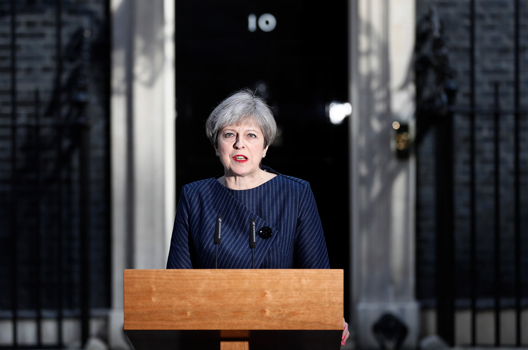 British Prime Minister Theresa May’s surprise decision to call for a snap general election is a powerful admission by her government that Brexit will not be an easy process. The next United Kingdom (UK) general election had been scheduled for May 2020, a date that would force May to campaign just as all the disadvantages of Brexit become clear. On April 18, May called for the election to be moved up to June 8, 2017. With five years allowed between elections, and assuming she wins the contest in June , the prime minister will have an additional two years—until spring 2022—to get through a difficult post-Brexit “transitional” phase before facing the voters again.
British Prime Minister Theresa May’s surprise decision to call for a snap general election is a powerful admission by her government that Brexit will not be an easy process. The next United Kingdom (UK) general election had been scheduled for May 2020, a date that would force May to campaign just as all the disadvantages of Brexit become clear. On April 18, May called for the election to be moved up to June 8, 2017. With five years allowed between elections, and assuming she wins the contest in June , the prime minister will have an additional two years—until spring 2022—to get through a difficult post-Brexit “transitional” phase before facing the voters again.
While Theresa May has repeatedly said she would not call a snap election, she has been left with little choice by the Brexit timetable. Negotiations with the other twenty-seven members of the European Union (EU-27), are unlikely to start in earnest until the fall, after the German general elections. Once those negotiations are underway, the focus through early 2019 will be on the so-called “divorce settlement;” the terms on which the UK will leave the European Union (EU). This will undoubtedly involve a British payout to settle financial accounts—a figure that some estimate will be as high as €60 billion. The recently published EU negotiating guidelines indicate that Britain may have to stay under the jurisdiction of the European Court of Justice during any transition to new arrangements. Both of these stipulations will be immensely unpopular with voters.
As the two-year deadline for concluding the divorce arrangements nears in March 2019, it will also become clear that leaving the EU will have an enormous impact on Britain. By that time, the regional funds that supported infrastructure development across the poorer areas of the UK will disappear; more foreign companies may have shifted investment (and jobs) to the EU; university students may no longer be able to easily study across Europe through the Erasmus program; vital flows of personal data from the EU may be restricted until a new privacy arrangement is in place; and the City of London – the hub of Britain’s economy – may face an uncertain future outside EU jurisdiction. With only a seventeen-seat majority in the British Parliament, May might even lose the parliamentary vote on the final Brexit deal and be forced to resign. Only in mid-2019 will Britain be able to formally negotiate new trade and regulatory arrangements with the European Union and others, including the United States. Such agreements typically take five years or more to conclude, leaving Britain in a very uncertain position by spring 2020.
Conducting an election campaign under such circumstances would be a disaster for the conservatives, May’s Conservative party, who would be blamed for putting the country on such a destructive path. Presumably, the May government would be saved by the weakness of the Labour party. However, if, by 2020, Jeremy Corbyn were no longer the Labour party leader, May could face a real challenge. A Labour-Liberal Democrat-Scottish Nationalist Party pro-EU coalition could mean the end of her premiership, even though any road back to EU membership would be exceptionally difficult. By moving the election to 2022, May puts off the prospect of such a challenge. Such a coalition may still form in that amount of time, but, as former British Prime Minister Harold Wilson pointed out, “a week is a long time in politics.” For Theresa May, five years is an eternity.
Moreover, there are very few risks to May and her government by calling the election now. She starts from an extremely strong position, with polls indicating an 18-20 percent lead over the Labour party. She could emerge from the contest on June 8 with a Conservative majority of over one hundred seats. The real puzzle is why Theresa May has been so reluctant to call an election until now. She argues that she is calling the election to strengthen her negotiating position vis-à-vis the European Union. It will undoubtedly do that, though Brussels will be watching closely to see what campaign promises may reveal about British negotiating strategy and red lines. However, May would have been able to lead the negotiations without this election. Indeed, a weaker position at home can force negotiating partners to recognize limitations and be more willing to compromise. With a presumably stronger majority, May will have a harder time pleading that domestic politics limits her ability to bargain.
The real issue is not the impact of this election on the Brexit negotiations, but rather the impact of the negotiations on an election in 2020. Facing the public just as the impact of Brexit becomes clear would doom Theresa May to become another Conservative prime minister whose career has been ended by Europe.
Frances G. Burwell is a distinguished fellow with the Atlantic Council.
Image: Britain's Prime Minister Theresa May speaks to the media outside 10 Downing Street, in central London, Britain April 18, 2017. British Prime Minister Theresa May called on Tuesday for an early election on June 8, saying the government had the right plan for negotiating the terms of Britain's exit from the European Union and she needed political unity in London. (Reuters/Stefan Wermuth)
